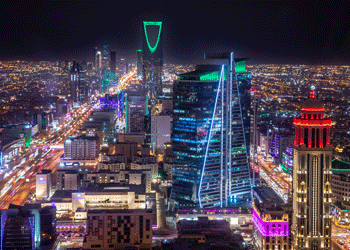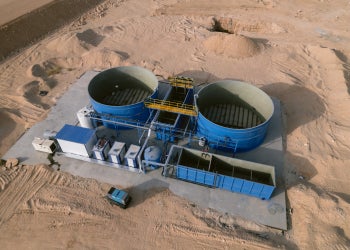Unlocking AI’s carbon conundrum
31 January 2025

This package also includes: Trump 2.0 targets technology
Abu Dhabi has recently launched a $6bn project that combines 5,200MW of solar and 19 gigawatt-hours (GWh) of battery energy storage capacity to deliver 1,000MW of round-the-clock renewable power capacity, a world first.
The project addresses the intermittency of renewable energy, which UAE Industry & Advanced Technology Minister Sultan Al-Jaber describes as the “moonshot challenge” of our time.
The goal is to deliver clean baseload capacity much more quickly and at a lower price than a gas or nuclear power plant.
At approximately $60 a megawatt-hour, the project aligns with the mandate of Emirates Water & Electricity Company (Ewec) to deliver the lowest-cost energy transition.
Abu Dhabi Future Energy Company (Masdar) will develop the project, which will help to boost its gross capacity, in line with expanding its renewable energy portfolio to 100GW by 2030.
Located on a land area of 90 square kilometres, the solar and battery project is due to become operational by 2027, Masdar’s chief operating officer, Abdulaziz Alobaidli, said on 14 January.
This is in addition to the 1.5GW of annual renewable capacity that Ewec intends to procure until at least the mid-2030s, in line with decarbonising the emirate’s electricity system and reaching net zero by 2050.
Following the project’s launch, Masdar announced the preferred engineering, procurement and construction and other sub-
contractors for the scheme.
AI and power link
In December, the US government reportedly approved the export of advanced artificial intelligence (AI) chips to a Microsoft-operated facility in the UAE, as part of the technology giant’s $1.5bn partnership with Mubadala-backed AI firm G42.
Three months earlier, in September, Sheikh Tahnoon Bin Zayed Al-Nahyan, deputy ruler of Abu Dhabi and national security adviser, met with Jake Sullivan, US national security adviser, in Washington to seal an agreement known as the Common Principles for Cooperation on AI, following a meeting between UAE President Mohamed Bin Zayed Al-Nahyan and then-US President Joe Biden.
The meeting took place a few days after US-based equity investment firm BlackRock announced a $100bn tech investment platform called Global AI Infrastructure Investment Partnership.
The fund’s partners include Mubadala-backed AI fund MGX, which aims to build $100bn in assets under management; US-based Global Infrastructure Partners; and Microsoft.
In January, MGX teamed up with US tech giant Oracle, Japan’s Softbank and ChatGPT creator Open AI to form the Stargate project, a joint venture that aims to invest $500bn in building AI infrastructure in the US over the next four years.
Abu Dhabi has not denied the link between its clean energy capacity buildout and the UAE’s national, and perhaps international, AI strategy.
A social media post on 14 January by President Mohamed Bin Zayed confirmed the 1GW solar plus battery project will directly support Abu Dhabi’s AI plans.
“The project will help power advancements in AI and emerging technologies, supporting delivery of the UAE National Strategy for Artificial Intelligence 2031 and the Net Zero by 2050 strategic initiative,” he said.
Investing in and developing AI infrastructure and applications at home and abroad is now a UAE government priority. It will create jobs and new revenues, and will boost efficiencies in every facet of governance and business.
“The UAE is well positioned [in the developing AI industry],” says Michael Liebreich, managing partner at UK firm EcoPragma Capital, noting that it has “the energy status, geographical advantage and regulatory framework”.
In light of a new US regulation made public in January that restricts access to US-made AI chips, he adds that “you don’t want to have a situation where the UAE will have to choose between one or the other”, referring to the ongoing power struggle over AI between China, an important energy and trade partner of the UAE, and the US, which is a vital political ally.
Investing in and developing AI infrastructure and applications … is now a UAE government priority
Choosing sides
It appears that this choice has been made previously, however.
In an interview in early 2024, G42 CEO Peng Xiao said that his firm is cutting ties with Chinese hardware suppliers in favour of US counterparts, adding: “We cannot work with both sides.”
In addition, in December, Axios – the US media outlet that reported the clearance of AI chip exports by the US to the Microsoft and G42 facility in Abu Dhabi – suggested that the deal is part of efforts by the US government to elbow China out of the UAE’s expanding tech industry.
In Abu Dhabi, Ewec is tasked not only with decarbonising its electricity system by integrating solar and nuclear plants into its gas-dominated power-generation fleets, but also with ensuring 24×7 clean and cheap baseload capacity gets delivered to a project that is a national priority.
An expanding AI industry will also increase the scope for environmental, social and governance (ESG) compliance.
While it is widely accepted that the use of advanced AI solutions such as large- or small-language models or agentic AI for industrial applications can enable some sectors to cut emissions, AI requires hyperscale data centres, and data centres generally are as polluting as the airline industry.
Although the high temperatures and water scarcity of the Middle East can be addressed by another ESG-sensitive industry – seawater desalination – these factors can lead data centres in the region to be more carbon positive than those in other geographies.
For this reason, Abu Dhabi’s 5.2GW/19GWh project is considered a major milestone, potentially blazing a trail that other regions can follow – assuming it is implemented on time and within budget, and despite opposing opinions on its technical and commercial feasibility.
Main image: Sheikh Tahnoon Bin Zayed Al-Nahyan, deputy ruler of Abu Dhabi and national security adviser, and Jake Sullivan, US national security adviser, signed a cooperation agreement on AI in September 2024. Credit: Wam
 READ MEED’s YEARBOOK 2025
READ MEED’s YEARBOOK 2025
MEED’s 16th highly prized flagship Yearbook publication is available to read, offering subscribers analysis on the outlook for the Mena region’s major markets.
Published on 31 December 2024 and distributed to senior decision-makers in the region and around the world, the MEED Yearbook 2025 includes:
|
> PROJECTS: Another bumper year for Mena projects
> GIGAPROJECTS INDEX: Gigaproject spending finds a level
> INFRASTRUCTURE: Dubai focuses on infrastructure
> US POLITICS: Donald Trump’s win presages shake-up of global politics
> REGIONAL ALLIANCES: Middle East’s evolving alliances continue to shift
> DOWNSTREAM: Regional downstream sector prepares for consolidation
> CONSTRUCTION: Bigger is better for construction
> TRANSPORT: Transport projects driven by key trends
> PROJECTS: Gulf projects index continues ascension
> CONTRACTS: Mena projects market set to break records in 2024
|
Exclusive from Meed
-
 Solar deals signal Saudi Arabia’s energy ambitions
Solar deals signal Saudi Arabia’s energy ambitions13 February 2026
-
 Saudi Arabia appoints new investment minister
Saudi Arabia appoints new investment minister13 February 2026
-
 Indian firm wins major Oman substation contract
Indian firm wins major Oman substation contract12 February 2026
-
 Developers appoint contractor for $500m wastewater treatment project
Developers appoint contractor for $500m wastewater treatment project12 February 2026
-
 Dewa raises Empower stake in $1.41bn deal
Dewa raises Empower stake in $1.41bn deal12 February 2026
All of this is only 1% of what MEED.com has to offer
Subscribe now and unlock all the 153,671 articles on MEED.com
- All the latest news, data, and market intelligence across MENA at your fingerprints
- First-hand updates and inside information on projects, clients and competitors that matter to you
- 20 years' archive of information, data, and news for you to access at your convenience
- Strategize to succeed and minimise risks with timely analysis of current and future market trends

Related Articles
-
 Solar deals signal Saudi Arabia’s energy ambitions
Solar deals signal Saudi Arabia’s energy ambitions13 February 2026
 Commentary
Commentary
Mark Dowdall
Power & water editorSaudi Arabia’s recent agreement to build $2bn-worth of solar power plants in Turkiye is the latest sign that the kingdom’s energy influence is changing.
Historically, this was measured in oil barrels and export volumes. Increasingly, this is extending to capital, structuring expertise and the ability to deliver record-low tariffs in competitive markets.
Announcing the deal, Turkish Energy Minister Alparslan Bayraktar said tariffs for the plants would be the country’s lowest on record, with electricity purchased under 25-year power purchase agreements.
It followed another announcement, in January, that Acwa is investing $200m to build a large-scale solar photovoltaic (PV) plant in the Philippines.
Whether Saudi-backed companies ultimately retain long-term stakes or primarily develop and build the assets, their role at the front end is significant.
Sponsors that bring sovereign backing, clear procurement processes and access to low-cost financing can influence tariffs and contract terms from the outset.
There is also a geopolitical layer. Investing in Turkiye, or anywhere for that matter, strengthens political and economic ties at a time when regional alignments are shifting.
Energy infrastructure is also long-term by its nature. It connects ministries, regulators, lenders and operators in relationships that often extend well beyond a single transaction.
Saudi Arabia has spent the past few years refining its approach to pricing, structuring and financing large-scale renewables at home.
Exporting that expertise may not rival oil in scale or visibility, but it does signal that Saudi Arabia is becoming more than just an energy supplier.
Increasingly, it is becoming a participant in how other countries design and finance their energy transitions. That influence is still significant.
https://image.digitalinsightresearch.in/uploads/NewsArticle/15645903/main.jpg -
 Saudi Arabia appoints new investment minister
Saudi Arabia appoints new investment minister13 February 2026
Register for MEED’s 14-day trial access
King Salman Bin Abdulaziz Al-Saud has made a series of senior government changes, including Khalid Al-Falih leaving his role as investment minister to become minister of state and a member of the cabinet.
Al-Falih has been replaced by Fahad Al-Saif as investment minister. Al-Saif has been head of the Investment Strategy and Economic Insights Division at the Public Investment Fund (PIF) since 2024. That role involved formulating PIF’s long-term investment strategy. He has also served as head of the Global Capital Finance Division, a role he has held since joining PIF in 2021.
The change of investment minister comes at a time when securing investments has become a key priority for Saudi Arabia as it prepares to hand over more projects to the private sector for delivery.
King Salman also named Abdullah Al-Maghlouth as vice-minister of media and Abdulmohsen Al-Mazyad as vice-minister of tourism. Khalid Al-Yousef was named attorney general, and Sheikh Ali Al-Ahaideb will serve as president of the Board of Grievances.
Faihan Al-Sahli was selected as director general of the General Directorate of Investigation, while Abdulaziz Al-Arifi was chosen to lead the National Development Fund. Haytham Al-Ohali will head the Communications, Space and Technology Commission, and Fawaz Al-Sahli will chair the Transport General Authority.
https://image.digitalinsightresearch.in/uploads/NewsArticle/15645415/main.gif -
 Indian firm wins major Oman substation contract
Indian firm wins major Oman substation contract12 February 2026

India’s Larsen & Toubro has won a contract to build the Majan 400/220/132kV grid station in Oman.
Estimated to cost $100m, the project includes an associated 400kV line-in line-out underground cable from Sohar Free Zone to the Sohar Interconnector Station.
The contract was awarded by Oman Electricity Transmission Company (OETC), part of the government-owned Nama Group.
The grid station will comprise eight 400kV gas-insulated switchgear (GIS) bays, eight 220kV GIS bays and 10 132kV GIS bays at the new Sohar Free Zone substation.
The scope includes the installation of two 500MVA, 400/220kV transformers and two 500MVA, 220/132kV transformers.
Local firm Monenco Consulting Engineers was appointed in April last year to provide design and supervision services for the project.
As MEED exclusively revealed, the main contract was tendered in June, as part of three significant contracts to build new substations in the sultanate.
The second contract, worth about $35m, covers the construction of the Sultan Haitham City 132/33kV grid station and associated 132kV line-in line-out underground cables running 4 kilometres from Mabella to Mabella Industrial Zone.
The third contract, valued at about $100m, covers the construction of the Surab 400/33kV grid station and an associated 400kV line-in line-out cable from the Duqm grid station to the Mahout grid station.
Local firms Muscat Engineering Consulting and Hamed Engineering Services are consultants for the Sultan Haitham City and Surab projects, respectively.
The two remaining contracts are currently under bid evaluation, with awards expected this quarter.
https://image.digitalinsightresearch.in/uploads/NewsArticle/15638107/main.jpg -
 Developers appoint contractor for $500m wastewater treatment project
Developers appoint contractor for $500m wastewater treatment project12 February 2026

Register for MEED’s 14-day trial access
Egypt’s Orascom Construction has won the engineering, procurement and construction (EPC) contract for a major wastewater treatment project in Saudi Arabia’s Eastern Province.
A consortium of Saudi utilities provider Marafiq, the regional business of France’s Veolia and Bahrain/Saudi Arabia-based Lamar Holding is developing the $500m (SR1.875bn) industrial wastewater treatment plant (IWWTP) in Jubail Industrial City 2.
Sources close to the project confirmed the appointment to MEED, adding that the project has now entered the construction phase.
Industry sources also said that financial close on the project is expected to be reached in the coming days.
In September, the developer consortium was awarded a contract, under a 30-year concession agreement, by Saudi Aramco Total Refining & Petrochemical Company (Satorp), a joint venture of Saudi Aramco and France’s TotalEnergies.
The planned facility will treat and recycle wastewater from Satorp’s under-construction Amiral chemical derivatives complex, also in Jubail.
Marafiq, formally Power & Water Utility Company for Jubail and Yanbu, will own a 40% stake in the dedicated project company. Veolia Middle East SAS will hold a 35% stake, and Lamar Holding’s Lamar Arabia for Energy will hold the other 25%.
The planned IWWTP, which will primarily serve the $11bn sprawling Amiral chemicals zone, will implement advanced water treatment and recovery technologies to process complex industrial effluents, including spent caustic streams. Treated water will be reintegrated into the industrial processes, supporting closed-loop reuse and energy efficiency.
The project follows a concession-style model, akin to a public-private partnership (PPP), where the developer consortium invests in, builds and operates the wastewater plant over a 30-year period, with returns linked to service delivery.
Marafiq has been involved in several similar projects across Saudi Arabia, including as the sole owner of the Jubail industrial water treatment plant (IWTP8), which treats complex industrial effluents for petrochemical and heavy industrial companies.
In 2020, Saudi Services for Electro Mechanic Works was awarded the $202m main contract for the fourth expansion phase of IWTP8. Construction works on the project are expected to be completed by the end of the quarter.
 READ THE FEBRUARY 2026 MEED BUSINESS REVIEW – click here to view PDF
READ THE FEBRUARY 2026 MEED BUSINESS REVIEW – click here to view PDFSpending on oil and gas production surges; Doha’s efforts support extraordinary growth in 2026; Water sector regains momentum in 2025.
Distributed to senior decision-makers in the region and around the world, the February 2026 edition of MEED Business Review includes:
> AGENDA: Mena upstream spending set to soar> INDUSTRY REPORT: MEED's GCC water developer ranking> INDUSTRY REPORT: Pipeline boom lifts Mena water awards> MARKET FOCUS: Qatar’s strategy falls into place> CURRENT AFFAIRS: Iran protests elevate regional uncertainty> CONTRACT AWARDS: Contract awards decline in 2025> LEADERSHIP: Tomorrow’s communities must heal us, not just house us> INTERVIEW: AtkinsRealis on building faster> LEADERSHIP: Energy security starts with rethinking wasteTo see previous issues of MEED Business Review, please click herehttps://image.digitalinsightresearch.in/uploads/NewsArticle/15637523/main.jpg -
 Dewa raises Empower stake in $1.41bn deal
Dewa raises Empower stake in $1.41bn deal12 February 2026
Dubai Electricity & Water Authority (Dewa) has announced it has increased its stake in Emirates Central Cooling Systems Corporation (Empower) from 56% to 80%.
The transaction was completed through the purchase of 2.4 billion shares and the transfer of the entire ownership of Emirates Power Investment (EPI), which is wholly owned by Dubai Holding.
The total value of the deal is AED5.184bn ($1.41bn).
Empower currently holds over 80% of Dubai’s district cooling market and operates 88 district cooling plants across the emirate.
According to MEED Projects, the UAE’s district cooling sector currently has nine projects worth $1.29bn in the pre-execution phase.
Empower has ownership in four of these projects, which have a combined value of $472m.
This includes a $200 million district cooling plant at Dubai Science Park, with a total capacity of 47,000 refrigeration tonnes serving 80 buildings.
Empower signed a contract to design the plant last August, with construction scheduled to begin by the end of the first quarter of 2026.
The utility is also building a district cooling plant at Dubai Internet City.
UAE-based TMF Euro Foundations was recently appointed as the enabling and piling subcontractor for the project.
https://image.digitalinsightresearch.in/uploads/NewsArticle/15635949/main.jpg

 Trump 2.0 targets technology
Trump 2.0 targets technology
